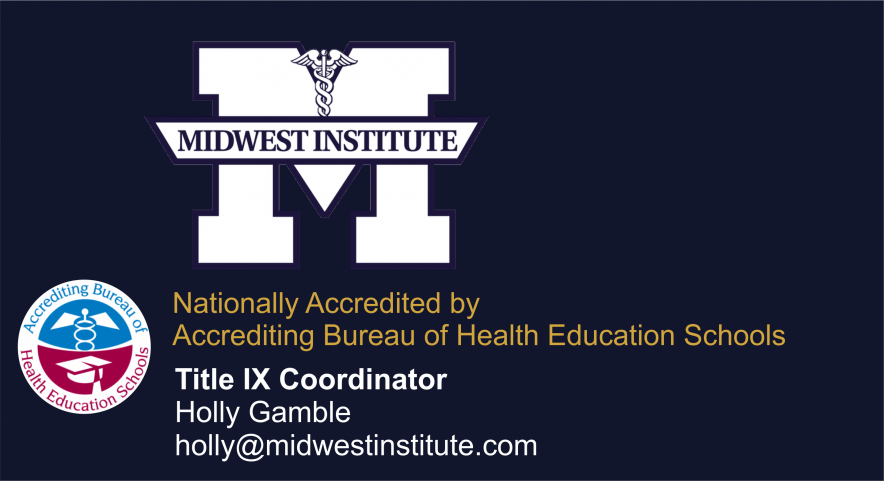Rachel Woods didn’t have the resources–or the time–to invest 8+ years in an advanced medical degree.
A mother of 3, she was already “in the trenches” of real life struggling to make ends’ meet when she decided she had to make a change.
“I just got tired of bouncing around from food service jobs to retail jobs,” she says. “Everything was a dead end.”
That was despite having graduated with an associates degree in social work from Southwestern Illinois College.
“I didn’t want to be stuck behind a desk all day,” she says. “I wanted something more interactive…a job I’d never have to worry about, [where] I could live anywhere and still have…good job security.”
Although it was the TV commercials for Midwest Institute that first piqued her interest in going back to school, the conviction that she needed to act came from her own hands-on research.
“I checked out their website, took a tour, [and] liked that the classrooms were small,” she says. “They also offered evening classes so I could still work and be with my family and do what I needed to do with them.”
“I finally had enough–I decided to follow through,” she says, and within a few weeks of her tour she found herself messaging Midwest her interest from a store parking lot.
Soon, Rachel was enrolled in Midwest’s allied health program, which provides degrees for the broad ‘support team’ that holds the region’s health care system together–and which are in increasingly high demand in the St. Louis area.
By taking advantage of Midwest’s medical assistant program, she was able to complete her entire degree in just nine months while still being there for her kids. (Focused on career marketability, most of the Midwest’s allied health degrees, including those for dental assistants and massage therapy in St. Louis MO, can be finished in less than a year.)
But the most remarkable thing about Rachel’s story was that it took place directly in the flow of real life: when she finished the program in 2016, she was expecting a baby, who was born just eight months after graduating.
“We finally got our boy,” she laughs, “So we’re all done now.”
In order to put time into being a mom, Rachel actually took a year off after she finished her externship graduation before looking for work. But this didn’t hurt her employability.
Rachel says she benefited immensely from Midwest’s focus on skill marketability beginning day one with small class sizes and job skill-centric instruction.
“I got a lot of one-on-one attention because the classes were small,” she says. Plus, “you make good friends because you’re in such a small setting.”
But it was the teachers themselves–who Rachel feels were personally invested in her success–that really made the difference. “I like how the teachers make themselves available to you.” She notes that some even gave students their cell phone numbers.
“The teachers are always reminding you what these jobs are looking for and the importance of your test scores and following up with lab procedures.”
If a student found a position where a particular lab procedure was an important job requirement and a student felt rusty they could always take a new class or set an appointment with a teacher to review.
“[This] helps you be that much more comfortable and confident going in,” Rachel says. “[It was] very helpful…especially when it came to job seeking.”
“Teachers take it seriously, helping people find jobs,” she continues. “[Even] the administrator called me to see how it was going.”
In fact, it was a teacher who helped Rachel get her dream job at the Washington University Medical Center of St. Louis when she reconnected with Midwest after taking a year off.
“One of my teachers knew how much it meant to me to work for Washington University,” she says, “So she called me and said ‘I found them–send your resume ASAP.’ So I did and I got it.”
Rachel started that job at the Washington University Medical Center this week.
It’s just two years since she declared her interest in Midwest’s allied health program, but today Rachel Wood has a degree in medical assisting, her dream job at a respected medical institution, many new friends and trusted mentors, and a healthy happy baby boy to show for the time.
She couldn’t be happier with her choice.
Wherever you are in your life, the next step you take should be the one that brings you closer to your dreams. If an allied health career is your gateway to that future, contact Midwest Institute today to learn more about the opportunities available to you.
How long does it take to earn an allied health degree?

While we can’t speak for other colleges, at Midwest Online, we focus on programs that quickly lead to jobs with high employment rates in the St. Louis, Missouri area. Most of the allied health degree programs we offer at Midwest take about nine months to complete.
What if something happens to prevent me from finishing all at once?

While we value students’ commitment to their education, we understand that your studies aren’t your only priority. From evening classes to flexible course order, we think you’ll find it’s easy to fit your career-advancing coursework around the priorities that already exist in your life.
But you don’t have to take our word for it.
Rachel told us she studied from September of 2015 through the following August, did her externship work for one month, then took a year off to have a baby. “We finally got our boy,” she laughs, “So we’re all done now.” When she was ready to seek employment, she reconnected with Midwest, and the staff got on the phone with their contacts and helped her land her dream job at Washington University Medical Center in St. Louis.
Will I be able to find a job right away?

Rachel said that she benefitted immensely from Midwest’s focus on skill marketability which begins on day one with small class sizes and job skill-centric instruction. But it was the instructors’ personal commitment to helping Rachel get her dream job–even after her year off–that had the greatest impact.
“One of my teachers knew how much it meant to me to work for Washington University,” she said, “So she called me and said ‘I found them–send your resume ASAP.’ So I did and I got it”
Rachel started her new job that job last week.
How do I know I’m ready to go back to school?

Ultimately the timing of your education is up to you, but sometimes it helps to ask someone who’s been where you are and decided to take the leap.
Maybe you can relate to Rachel’s experience.
“I just got tired of bouncing around from food service jobs to resource jobs,” she says of deciding to go back to school, “Everything was a dead-end.”
This was true for her even though she had gone to school before. “I got an associates degree in social work [at Southwestern Illinois College], but I didn’t want to be stuck behind a desk all day. I wanted something more interactive…I wanted a job I’d never have to worry about, [where] I could live anywhere and still have…good job security.”
Rachel says that the commercials for Midwest Institute of Massage Therapy she saw on TV were what piqued her interest initially, but it was the tour of the campus that helped seal the deal.
“I checked out their website, took a tour, [and] liked that the classrooms were small,” she says. “They also offered evening classes so I could still work and be with my family and do what I needed to do with them.”
She remembers messaging Midwest from a store parking lot to let them know she was interested. “I finally had enough, I decided to follow through,” she says.
Now, two years later, she has a degree in medical assisting–her dream job–a bunch of new friends, and a healthy happy baby boy to show for her time, and couldn’t be happier with her choice.
There are plenty of options for schools to attend in the St. Louis area. Why choose Midwest?

There are plenty of options for trade schools in St. Louis, but where to seek a degree or job training is ultimately a personal choice, so we’ll let Rachel speak to this.
Rachel feels that the small class sizes in her core classes were a huge advantage. “I got a lot of one-on-one attention because the classes were small,” she says. Plus, “you make good friends because you’re in such a small setting.”
For Rachel, it was the teachers themselves who really made the difference. “I can’t get over how friendly the staff is,” she says.
During class, the teachers make a point of “reminding you what these jobs are looking for and the importance of your test scores and following up with lab procedures.” Rachel feels the Midwest instructors and staff were personally invested in her success, helping her and her classmates stay focused on the end goal of gainful employment.
Outside of classroom hours, they also help students find externships and clear space in their schedules to help students and alumni sharpen important skills that have gotten rusty. “I like how the teachers make themselves available to you,” Rachel says, noting that some even gave students their cell phone numbers.
Again, where to seek a degree or job training is ultimately a personal choice, so we’ll let Rachel speak to this.
Rachel feels that the small class sizes in her core classes were a huge advantage. “I got a lot of one-on-one attention because the classes were small,” she says. Plus, “you make good friends because you’re in such a small setting.”
For Rachel, it was the teachers themselves who really made the difference. “I can’t get over how friendly the staff is,” she says.
During class, the teachers make a point of “reminding you what these jobs are looking for and the importance of your test scores and following up with lab procedures.” Rachel feels the midwest instructors and staff were personally invested in her success, helping her and her classmates stay focused on the end goal of gainful employment.
Outside of classroom hours, they also help students find externships and clear space in their schedules to help students and alumni sharpen important skills that have gotten rusty. “I like how the teachers make themselves available to you,” Rachel says, noting that some even gave students their cell phone numbers. If a student finds a position where ability to perform a particular lab procedure is an important job requirement, but it’s one the student hasn’t practiced in a while, “you can freshen up with new classes,” or make appointments with teachers to review so you’re ready.
“[This] helps you be that much more comfortable and confident going in,” Rachel says. This personal touch was “very helpful and very appreciated, especially when it came to job seeking.”
“[They] take it seriously, helping people find jobs,” Rachel continues, “[Even] the administrator called me to see how it was going.”
The next step you take should be the one that brings you closer to your dreams.

If you’re still reading this and are interested in expanding your employment options to include a career in allied health, contact us! We’d love to take you on a tour of one of our two campuses, or just answer any other questions you may have about the many programs we offer at Midwest, inside and outside of allied health. You can call us directly, or send a message through our online portal and someone will respond via email right away. We look forward to hearing from you!




